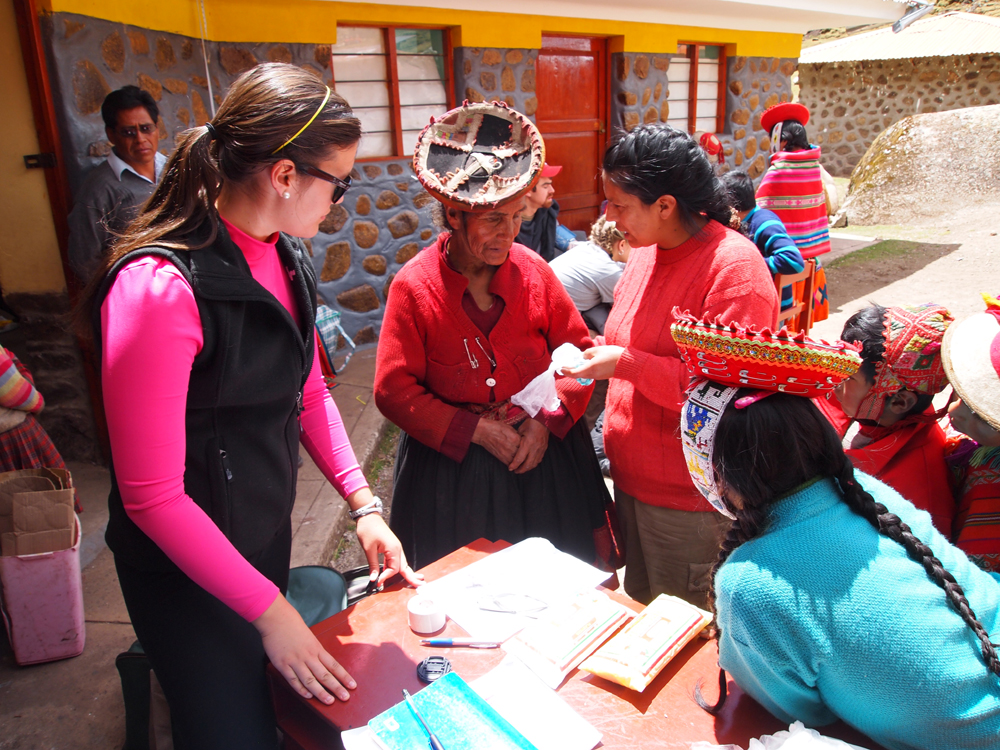Sarah Sexton: “Promotion of Health Access in Peru’s Sacred Valley”

As I placed my feet onto the red-eye flight to Lima, Peru I instantly felt a rush of emotions that had been building up in my stubborn self for several months. From the discussions of packing to the safety concerns from my family, it was not until my long flight that I started to consider what I had gotten myself into. The next 24 hours of travel that involved several plane transfers, unsafe cars, donkeys, and wagons proved to become a microcosm of the adventures I had voluntarily placed myself in for the next few months.
As a health education coordinator working for Sacred Valley Health in Ollantaytambo, Peru, it was my responsibility to develop and train community health workers (promotoras) in 7 surrounding communities. With little knowledge about the communities, I found my first day hiking 8 hours with a Peruvian nurse to quickly learn about my main areas of focus. Let me say that hiking over 14,000 ft. passes and extreme conversation barriers leaves a lot of time to think, and a lot of time to complain about your aching legs. In fact, the majority of my time in Peru was spent in solitude trekking across the mountains, riding donkeys across the passes, or more commonly hitchhiking in the back of an animal truck just praying to get back to my village. Everyday I left my home in Ollantaytambo, never knowing what danger I may face, or if I would make it down the mountain alone. If I wasn’t hiking or up working in one of my communities, my time was spent in my own village. This often included hour-long meals eating guinea pig, being chased by rabid dogs, or more simply just living out underneath the beauty of the stars. With zero electricity, I didn’t have any modern conveniences such as a hot shower, running toilet, or even a normal sleeping arrangement for several months. Despite the hardships that I faced, these were the three best months of my life, and I am yearning for the moment that I can return.
While you might think I am crazy after reading this, these three months gave me a new direction in life, a new light in my outlook, and the first time I truly put my medical anthropology teachings to work. I was culturally stripped of anything familiar, and was placed in many uncomfortable situations that I really never imagined I would face before. Ultimately it was through this awareness that I began to see the direct needs of women’s health within my own town. Despite having a posta nearby, these women had little understanding of their own health. After speaking with my director, I sat down with several Peruvian nurses and surrounding promotoras to learn about their understandings for women’s healthcare. Through our discussions, I began to actively see the underlying cultural, historical, and economic pressures that affect these women daily. With the historical and cultural ideal of “machismo,” many of these women felt little control over their personal health behaviors and beliefs. Economically, these women had little access to healthcare and education to learn about healthy behaviors. Knowing this task was going to be daunting, I teamed up with a Peruvian nurse to create culturally competent health education classes for the women in my town. From building paper box body parts to making health pamphlets in their native language (Quechua), I incorporated their local beliefs with basic biomedical teachings so that the women would learn to trust my tools and knowledge. Over the next few months, I began to see changes that I had never imagined. These once silent women began to speak, laugh, and work with the instructors to become advocates of women’s health within their own communities.
Over the course of time, the health classes began to expand past my original small classroom to the fields of many small Peruvian villages. From teaching alternatives of cuy (guinea pig) blood on small wounds to basic CPR, my time with these women taught me more than I could ever imagine. Since the first classes, Sacred Valley Health now has an entire team of promotoras working in their rural communities. Beyond the fields, the Scared Valley Health promotora program has become a pilot program for Socios en Salud based out of Lima, Peru. The women have become strong in the confidence, and in return grown their communities past the rugged mountains that isolate them. This experience gave me the first-hand account of everything that I had learned during my time at Carolina, and I am thankful for the prior knowledge I had before beginning my Peruvian adventure. While my studies began in the clinic, my heart has now found its home working and teaching with underserved communities. I will now go on to continue my education at Emory University as a dual degree student. I will combine both a master’s in public health with physician assistant studies so that I may one day return to Peru and help those that literally taught me the world.
Sacred Valley Health: http://www.sacredvalleyhealth.org/
Year of graduation: 2012
Profession/employment/post-graduate study: Sacred Valley Health and now will attend Emory University MPH/PA dual degree program in the fall
Who and what inspires you: Dr. Rivkin-Fish (I’m not kidding, she literally taught me more than anyone ever has and I am SO extremely thankful for her encouragement to take this plunge of faith into Peru.)
Favorite anthropology book: The Spirit Catches You and You Fall Down by Anne Fadiman.
